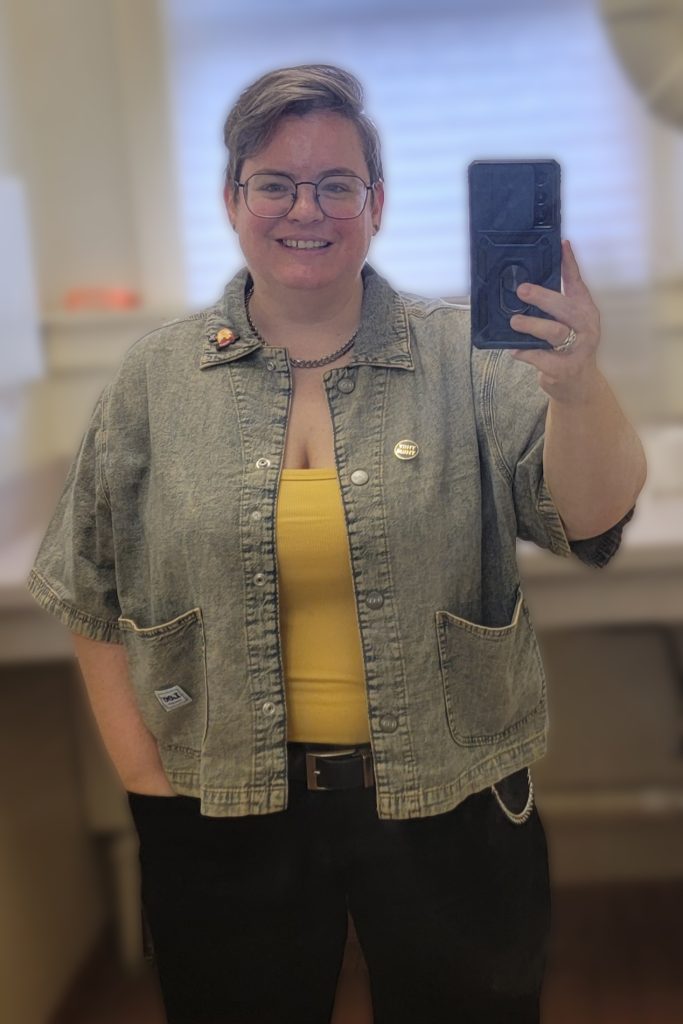This is Me

As I mentioned in last year’s ‘Coming Out Day’ post, I’ve been questioning my gender for several year, ever since our minster at the time, Rev. Connie Simon, asked the congregation to wear pronoun stickers on their name tags. I encountered some ‘big feelings’ at her request, and at the time I didn’t quite know why. I gave the matter some real thought over the years, but it wasn’t until my sabbatical that I was finally able to delve deeper into the matter. And, it all began with Sonya Renee Taylor and her book The Body is Not An Apology. Thanks to Taylor, a few fiction authors, and the support of my communities, I can now say I’m transmasc non-binary (They/Them pronouns). Here are the quotes and questions I gathered from Taylor’s book that I think are worth considering…
Quotes
- How we value and honor our own bodies impacts how we value and honor the bodies of others… we must build in us what we want to see built in the world. p. 5
- “There is no wrong way to have a body” – Glen Marla p. 10
- Taking up space we have previously been denied is a step toward bringing a just balance of power and resources (i.e. space) in the world. It is an act of radical love. Why are we constantly apologizing for the space we inhabit? p. 16
- Understanding is not a prerequisite for honor, love, or respect… Not knowing is an opportunity for exploration without judgement or demands. p. 22
- Health is not a state we owe the world. We are not less valuable, worthy, or loveable because we are not healthy. p. 24
- Your body need not be a prison sentence. p. 26
- Children’s bodies are not public property. Teaching children bodily autonomy, privacy, and consent are the cornerstone of raising radical self-love humans. p. 33
- Rendering differences invisible validates the notion that there are parts of us that should be ignored, hidden, or minimized, leaving in place the unspoken idea that difference is the problem and not our approach to dealing with difference. p. 36
- Relationships with our bodies are social, political, and economic inheritances. p. 42
- It is an act of terrorism against our bodies to perpetuate body shame and to support body based oppression. I call this “body Terrorism.” p. 58
- You are not your thoughts. p. 67
- Guess what? Your brain is part of your body! p. 76
- Truthfully, radical self love is not the work of superheroes but of community and connection… we must learn to be with each other if we plan to get free. p. 80
- We desperately want our good intentions and niceness to be enough. Although each of us is inherently “enough” to be loved, valued, cared for, and treated with respect, our efforts to raze systems of oppression and injustice will require more than our niceness. p. 83
- Each of us is responsible for our sphere of influence. p. 88
- This responsibility [to disrupt body terrorism] is distinct from some sort of savior complex in which radical self love emboldens you to save the poor and downtrodden of Earth. Radical self-love is a manifestation of our interdependence. p. 89
- We treat new ideas like we treat bodies, dismissing what we can’t understand, what we view as too different. p. 101
- In a society incredibly adept at harsh and often cruel critique, it is deeply moving to witness one tending to their own culpability with a sense of humility, compassion, and grace. p. 111
- Liberation is the opportunity for every human, no matter their body, to have unobstructed access to their highest self, for every human to live in radical self-love. p. 130
Questions
- When Taylor talks about ‘taking up space,’ she’s not only talking about physical space, but mental, emotional, and social space as well. When was the last time you stopped yourself from taking up space? How would things have been different if you had claimed the space instead?
- When was the last time you engaged in exploration ‘without judgement or demand?’ What or who do you love, honor and respect without understanding?
- What makes you different from those in your communities?
- What messages does media send you about your body? What messages does the government send you? What messages did you receive about your body during your childhood? What messages do you tell yourself?
- How can you extend compassion and grace toward yourself today?
Thanks for reading! I hope you’ll come back in September for an overview of Dean Spade’s book Mutual Aid: Building Solidarity Through this Crisis (and the Next).
